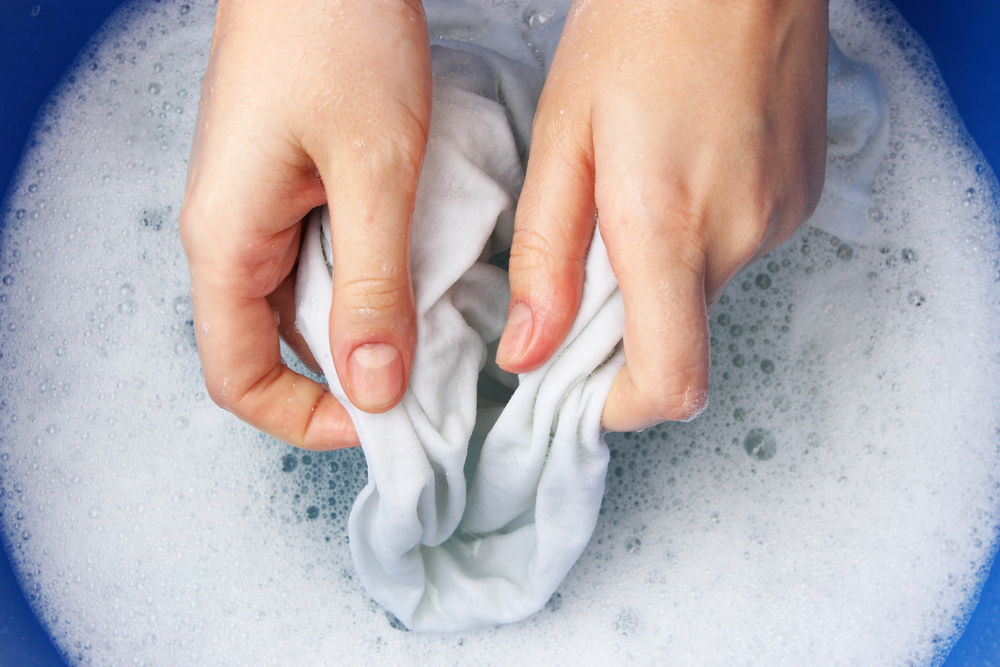How Should I Clean Wet Clothes Affected by Filth?
Shafi'i Fiqh
Answered by Shaykh Irshaad Sedick
Question
Suppose I have a damp spot on my clothing (from sweat, water used for cleaning, or any other source), and impurity comes into contact with it (such as pre-semen, blood, etc.). Is it enough to clean only the part of the clothing directly touched by the impurity?
Answer
In the Name of Allah, the Most Merciful and Compassionate.
May Allah guide every dimension of our lives to that which pleases Him.
Filth is spread by impurity. A small amount of liquid (less than 200 liters) becomes impure by mere contact with filth. You should clean the affected item by removing any apparent traces of filth and then allowing water to flow over the affected area, and Allah knows best. [Nawawi, Minaj al-Talibin]
Impurities are of Three Types:
- Mughallaza (heavy).
- Mukhaffafa (light).
- Mutawassita (moderate/medium).
Heavy impurity is from a dog, pig, or their offspring.
Light impurity is the urine of a baby (boy), which only feeds on milk and is not yet two years of age.
All other remaining impurities are moderate impurities. [Hadrami, Safinat al-Naja]
How to Clean Impurities
Heavy impurity becomes pure by removing it and then washing it seven times, one of which should be with earth.
Light impurity will be purified by removing the actual impurity and sprinkling adequate water upon it (the amount of water sprinkled should be greater than the amount of urine).
Moderate impurity is of two kinds: (1) that which has a substance and (2) that without a substance.
- That which has a substance is that which has a color, smell and taste. It is necessary to remove its color, smell and taste. (It is obligatory to remove all of its taste, even if it is difficult, and to remove both colour and smell if not difficult. If any of the smell or color alone is difficult to remove, then the fact that one of these two remains does not affect the purity. However, if both the color and smell remain in a spot, it is not considered pure.)
- The one which has no substance is the one that does not have a color, smell and taste. It is sufficient that water flows over it. (If the effects of sun, fire, or wind remove the traces of the impurity, the ground is still not pure until water has been poured over it.) [ibid.]
I pray this is of benefit and that Allah guides us all.
[Shaykh] Irshaad Sedick
Checked and Approved by Shaykh Faraz Rabbani
Shaykh Irshaad Sedick was raised in South Africa in a traditional Muslim family. He graduated from Dar al-Ulum al-Arabiyyah al-Islamiyyah in Strand, Western Cape, under the guidance of the late world-renowned scholar Shaykh Taha Karaan.
Shaykh Irshaad received Ijaza from many luminaries of the Islamic world, including Shaykh Taha Karaan, Mawlana Yusuf Karaan, and Mawlana Abdul Hafeez Makki, among others.
He is the author of the text “The Musnad of Ahmad ibn Hanbal: A Hujjah or not?” He has served as the Director of the Discover Islam Centre and Al Jeem Foundation. For the last five years till present, he has served as the Khatib of Masjid Ar-Rashideen, Mowbray, Cape Town.
Shaykh Irshaad has thirteen years of teaching experience at some of the leading Islamic institutes in Cape Town). He is currently building an Islamic online learning and media platform called ‘Isnad Academy’ and has completed his Master’s degree in the study of Islam at the University of Johannesburg. He has a keen interest in healthy living and fitness.
